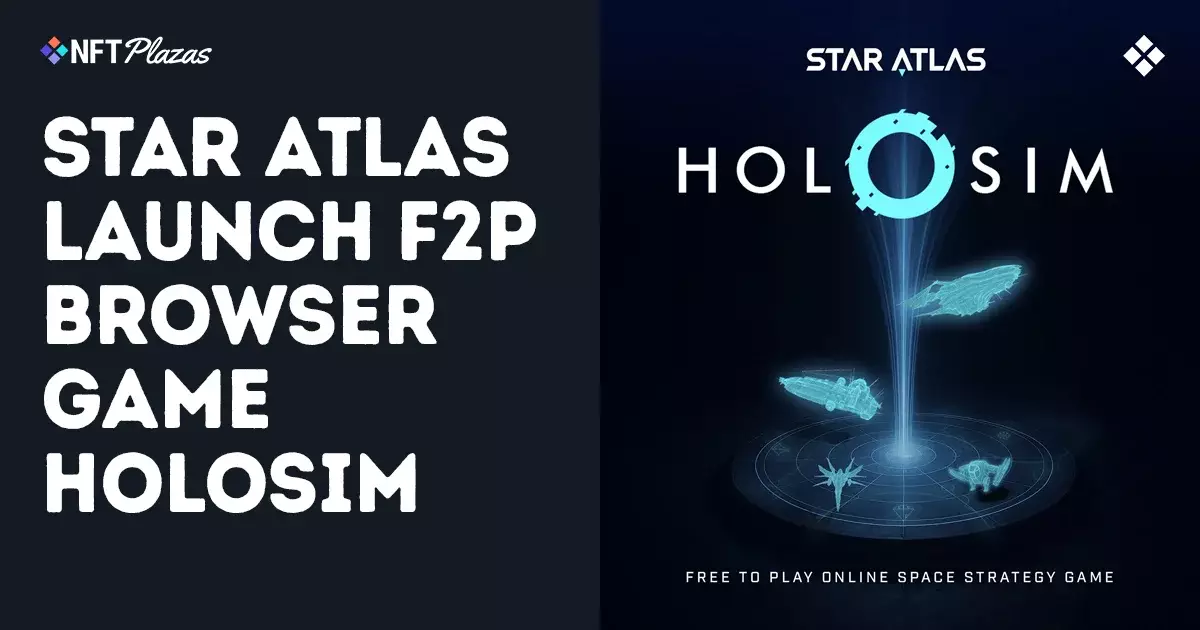The recent launch of Holosim by Star Atlas raises intriguing questions about the future of gaming and the philosophical underpinnings of the industry. Catering to a growing market of gamers who are cautious about diving into pay-to-win environments, Holosim offers a free-to-play avenue to access the world of Star Atlas. However, is this merely a marketing ploy, or does it signify an earnest effort to make games more accessible without sacrificing depth? The dichotomy between free and premium experiences often shapes our engagement; thus, the introduction of Holosim challenges traditional notions. It begs the question: can truly immersive experiences exist in a free landscape, or is the belief in overwhelming generosity just an illusion?
Holosim positions itself as a testbed for upcoming features, but one has to wonder if current players will find it merely a lightweight experience. While the absence of Web3 features might lure in new players, will it dissuade veterans who crave a robust challenge? The gaming community has a notorious reputation for valuing hardcore mechanics, and offering a stripped-down version of the main game may frustrate, rather than excite, seasoned participants.
Feature-Driven Development: Progress or Regression?
Star Atlas claims that Holosim will serve as a testing ground for new features. While innovation is the heartbeat of tech development, this method of crowd-sourced play-testing is often fraught with risk. The ambiguity surrounding when these features will integrate into the main game raises concerns about long-term player engagement. Developers might argue that obtaining feedback in real time speeds up development cycles, yet this model often feels like creating a game while players are looking. Players deserve a polished experience rather than partaking in a risky experiment.
Moreover, the fray over features—like the SAGE AI assistant, questing system, and automated fleet management—hints at a broader trend in the gaming sphere. Players are demanding more assistance, which raises an important issue: are we infantilizing the gaming experience? A game’s intellectual rigor can enhance satisfaction, whereas too much automation risks diluting the original thrill. If players want automation, perhaps they are looking for a gaming dress rehearsal instead of legitimate gameplay.
The Economics of Star Atlas: Tentative Ventures in Digital Currency
Star Atlas prides itself on a community-driven economy anchored by the $ATLAS token, boasting a market cap exceeding $21 million. However, crypto-based gaming is teetering at the perilous edge of speculation and hyperinflation. The volatility of cryptocurrencies often dictates the worth of in-game assets; deep-pocketed players can easily dominate markets and undermine the very ecosystem that Star Atlas is striving to cultivate.
A key issue confronting games in the crypto sphere is the psychology of investing. Generating hype around in-game assets can spiral into an economic nightmare, where players get burned by the sheer optimism that drove them to play in the first place. Holosim may present itself as an inclusive entry point, but if the expectations of wealth creation overshadow gameplay enjoyment, the appeal quickly fades. This balance between enjoyment and economic engagement is precarious at best.
Community Engagement: A Double-Edged Sword
The inclusion of community dynamics is a compelling aspect of digital gaming. Star Atlas engages players as they battle for supremacy among three factions, offering a shared narrative. Yet, community-driven economies also come with a downside: they can fracture into toxic competitive spaces. What happens when community interests clash, and how will this influence the tone of upcoming gameplay? A united front that turns hostile can lead to much dissension within the ranks, ultimately driving players away.
The dynamics within the community induce several factors of strategy and gameplay that may inevitably yield unequal experiences. Encouraging teamwork is laudable, but it can also create cliques that alienate newcomers. For a genre that thrives on immersion and fostering relationships, hostility can have a devastating effect on player retention and enjoyment.
Cultural Reflections: The Games We Play
In a world increasingly dominated by digital interactions, gaming is a compelling avenue for social reflection. In its ambition to create an immersive universe, Star Atlas enters the perilous territory of serving not just as entertainment, but a commentary on cosmic imperialism and the human condition. The decisions made by players resonate beyond simple victory conditions; factions signify the timeless struggle for power, mirroring societal dynamics.
Star Atlas, and by extension Holosim, reflects larger concerns of autonomy, freedom, and agency. It presents players with an opportunity to reassess their roles within their communities, both virtual and real. As players maneuver their fleets across celestial realms, they’re not just gaming; they’re engaging in a conversation about existence and the ethical implications tied to resource acquisition.
Star Atlas has the potential to redefine how we immerse ourselves in games, not merely as pastimes but as reflective cultural artifacts that shape our communal narratives. In an industry ripe for transformation, how Star Atlas charts its course could lead to reflections much broader than mere entertainment.


Leave a Reply